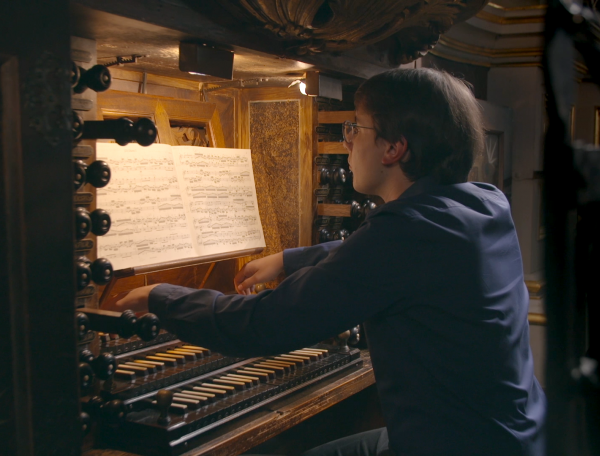

Wenn wir in höchsten Nöten sein
BWV 641 performed by Daniel Seeger
Freiberger Dom Sankt Marien, Freiberg, Germany
Behind the music
Balanced and inventive
Bach soothes us
Wenn wir in höchsten Nöten sein, BWV 641, comes from the Orgelbüchlein, a collection of chorale preludes compiled by Bach between 1712 and 1717. A chorale prelude – a short introduction by the organist – ensured that the congregation knew which hymn they had to sing.
At the time BWV 641 was created, Bach was working in Weimar, as an organist and chamber musician at the court of Duke Wilhelm Ernst. In the preceding years, Bach had gained plenty of improvisation experience in the position of organist. In his first chorale preludes, he was still searching for his own style, and his urge to experiment was rather too obvious, but here we hear the Bach we all admire so much. Balanced and infinitely inventive, with an ear for both tradition and the latest fashion, and always focused on the character of the text. It was the first time that Bach had compiled such a systematic collection of chorale arrangements. Apparently, he was aware of the standard he had reached in them.
The soothing music accompanies the chorale Wenn wir in höchsten Nöten sein. If we find ourselves in dire straits, we know that in any case we can call on the Lord together. Originally, it was a Calvinist hymn (Lève le coeur), with a melody by the renowned hymn writer Louis Bourgeois. The Lutherans seem to have liked this melody, as it is also used for the chorale Vor deinem Thron tret' ich hiermit. Bach wrote the chorale prelude of this name at the end of his life – and the story goes that he dictated it from his deathbed.
Orgelbüchlein, BWV 599-644
During his time as court organist at Weimar (1708-1714), Bach already started compiling his first collection of chorale arrangements and chorale preludes (compositions based on Lutheran hymns). They were intended to be used in church services, and the preludes were an introduction to congregational singing. According to the list of contents in Bach’s manuscript, it was supposed to have been a collection of 164 compositions, but in the end it did not exceed 46 (BWV 599-644). The order, combined with the limited length of the pieces, indicates that Bach was planning to compile a complete cycle of chorale arrangements. Later, in his period at Köthen, he gave the collection a title page, which reads: ‘Orgel-Büchlein, Worinne einem anfahenden Organisten Anleitung gegeben wird, auff allerhand Arth einen Choral durchzuführen…’ (‘Little organ book, in which a beginner organist is taught to arrange a chorale in all sorts of ways...’). So at the time, he intended the collection just as a teaching manual, maybe to present on his application in 1722 for the post of cantor at the Thomasschule in Leipzig, which was an important teaching position. The pupils must have had a hard time of it, as the preludes contain the complete range of baroque keyboard techniques in a nutshell.
- BWV
- 641
- Title
- Wenn wir in höchsten Nöten sein
- Instrument
- organ
- Genre
- organ works
- Serie
- Orgelbüchlein
- Year
- 1714-1715
- City
- Weimar
With support from
Extra videos
Vocal texts
Original
Translation
Credits
-
- Release date
- 30 March 2023
-
- Recording date
- 16 September 2020
-
- Location
- Freiberger Dom Sankt Marien, Freiberg, Germany
-
- Organist
- Daniel Seeger
-
- Organ
- Gottfried Silbermann, 1711-1714
-
- Director and editor
- Robin van Erven Dorens
-
- Music recording
- Guido Tichelman, Bastiaan Kuijt
-
- Music edit and mix
- Guido Tichelman
-
- Camera
- Robin van Erven Dorens, Onno van der Wal
-
- Lights
- Ernst-Jan Thieme
-
- Assistant music recording
- Marloes Biermans
-
- Producer
- Jessie Verbrugh
-
- With support from
- MWH4impact
Discover
Help us to complete All of Bach
There are still many recordings to be made before the whole of Bach’s oeuvre is online. And we can’t complete the task without the financial support of our patrons. Please help us to complete the musical heritage of Bach, by supporting us with a donation!

